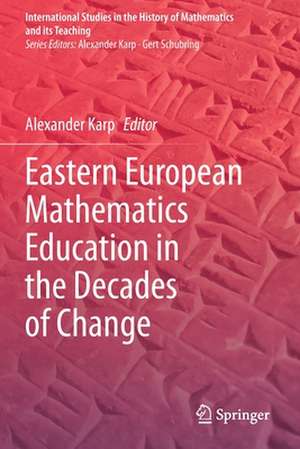Eastern European Mathematics Education in the Decades of Change: International Studies in the History of Mathematics and its Teaching
Editat de Alexander Karpen Limba Engleză Paperback – 5 mai 2021
This contributed volume is devoted to the recent history and evolution of mathematics education in Eastern Europe, exploring how it was influenced by social and political changes in this part of the world. Despite the broad recognition of the importance of these changes, little scholarship exists that examines the ways in which they were followed by changes in the teaching of mathematics in the post-socialist countries. Indeed, the analyzed processes are complex and vary across the states. Accordingly, this book touches on many factors--including differences in cultures and traditions – that find expression in the teaching of mathematics.
Specifically, this volume seeks to explore what changes there were in education in general and in the position of mathematics in school education in these years, and how these changes may be explained and documented; what changes there were in the content of mathematics education and its assessment, and how were they motivated andadopted; what new textbooks appeared and what new methodological ideas were offered in them; how and why mathematics teacher education and/or professional development changed; what was the role (if any) of foreign influences on mathematics education, etc.
The book will be of interest to both researchers in mathematics education and practitioners-teachers, as well as a broader audience of historians and educators exploring the political aspects of education.
| Toate formatele și edițiile | Preț | Express |
|---|---|---|
| Paperback (1) | 641.71 lei 43-57 zile | |
| Springer International Publishing – 5 mai 2021 | 641.71 lei 43-57 zile | |
| Hardback (1) | 648.05 lei 43-57 zile | |
| Springer International Publishing – 5 mai 2020 | 648.05 lei 43-57 zile |
Preț: 641.71 lei
Preț vechi: 754.95 lei
-15% Nou
Puncte Express: 963
Preț estimativ în valută:
122.79€ • 128.55$ • 101.60£
122.79€ • 128.55$ • 101.60£
Carte tipărită la comandă
Livrare economică 07-21 aprilie
Preluare comenzi: 021 569.72.76
Specificații
ISBN-13: 9783030387464
ISBN-10: 3030387461
Ilustrații: XVII, 305 p. 16 illus., 8 illus. in color.
Dimensiuni: 155 x 235 mm
Greutate: 0.45 kg
Ediția:1st ed. 2020
Editura: Springer International Publishing
Colecția Springer
Seria International Studies in the History of Mathematics and its Teaching
Locul publicării:Cham, Switzerland
ISBN-10: 3030387461
Ilustrații: XVII, 305 p. 16 illus., 8 illus. in color.
Dimensiuni: 155 x 235 mm
Greutate: 0.45 kg
Ediția:1st ed. 2020
Editura: Springer International Publishing
Colecția Springer
Seria International Studies in the History of Mathematics and its Teaching
Locul publicării:Cham, Switzerland
Cuprins
Introduction: A Time of Changes: What Is Its Interest to Mathematics Educators?.- Chapter 1: Mathematics Education in the Czech Republic since 1989.- Chapter 2: Mathematics Education in Eastern Germany since 1990.- Chapter 3: Mathematics Education in Estonia since 1991.- Chapter 4: Mathematics Education in Hungary since 1989.- Chapter 5: Mathematics Education in Poland since 1989.- Chapter 6: Mathematics Education in Russia since 1991.- Chapter 7: Mathematics Education in Ukraine since 1991. Conclusion: Trends and Outcomes.
Recenzii
“Such transparency presents the book as a valuable resource for other communities that strive to improve their educational systems. The volume is vibrant with references to official government documents that further support its high validity. … Another area of research could include the students and their responses to diverse learning methods offered.” (Andrzej Sokolowski, MAA Reviews, December 26, 2021)
Notă biografică
Alexander Karp is a professor of mathematics education at Teachers College, Columbia University. He received his Ph.D. in mathematics education from Herzen Pedagogical University in St. Petersburg, Russia, and also holds a degree from the same university in history and education. Currently, his scholarly interests span several areas, including the history of mathematics education, gifted education, mathematics teacher education, and mathematical problem solving. He served as the managing editor of the International Journal for the History of Mathematics Education and is the author or editor of over one hundred publications, including over thirty books.
Textul de pe ultima copertă
This contributed volume is devoted to the recent history and evolution of mathematics education in Eastern Europe, exploring how it was influenced by social and political changes in this part of the world. Despite the broad recognition of the importance of these changes, little scholarship exists that examines the ways in which they were followed by changes in the teaching of mathematics in the post-socialist countries. Indeed, the analyzed processes are complex and vary across the states. Accordingly, this book touches on many factors--including differences in cultures and traditions – that find expression in the teaching of mathematics.
Specifically, this volume seeks to explore what changes there were in education in general and in the position of mathematics in school education in these years, and how these changes may be explained and documented; what changes there were in the content of mathematics education and its assessment, and how were they motivated andadopted; what new textbooks appeared and what new methodological ideas were offered in them; how and why mathematics teacher education and/or professional development changed; what was the role (if any) of foreign influences on mathematics education, etc.
The book will be of interest to both researchers in mathematics education and practitioners-teachers, as well as a broader audience of historians and educators exploring the political aspects of education.
Caracteristici
Presents the panorama of the developments in mathematics education during the period of political changes and reforms Uniquely explores the question of how social and political changes influenced the development and condition of mathematics education in a the context of post-socialist Eastern Europe Offers new perspectives on the history of Eastern European mathematics education to a broad audience of mathematics educators, practitioners, and educational and political historians







